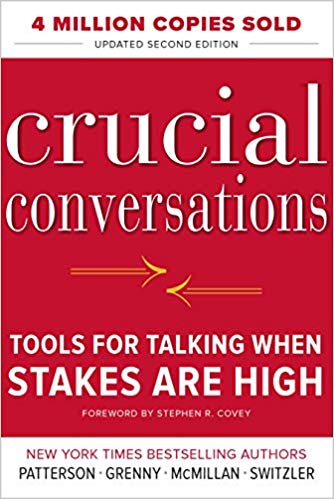

This article is an excerpt from the Shortform summary of "Crucial Conversations" by Kerry Patterson. Shortform has the world's best summaries of books you should be reading.
Like this article? Sign up for a free trial here .
Do you want to know how to prepare for a difficult conversation? Are you looking for tools to learn more?
When learning how to prepare for a difficult conversation, there are many factors to take into account. But with practice, you can assemble the right tools to best prepare for a difficult conversation
What Is a Difficult Conversation?
When you’re learning how to prepare for a difficult conversation, your first question is likely: What is a difficult conversation? Why do you need to prepare? When you’re involved in a fast-moving crucial conversation, it can be hard to remember and apply the dialogue skills and principles. This chapter offers a simple suggestion for getting started, as well as a quick review of the principles and skills.
A crucial conversation is a discussion characterized by high stakes, differing opinions, and strong emotions. Crucial conversations are often typical daily interactions as opposed to planned, high-level meetings. These conversations can have a huge impact on your life. Examples include: ending a relationship, asking a roommate to move out, resolving an issue with an ex-spouse, confronting a coworker about his/her behavior, or giving the boss critical feedback.
We often try to avoid having these conversations because we’re afraid we’ll make matters worse. And in fact, when we do have crucial conversations, we usually handle them badly. We behave our worst at the most critical moments. We may withdraw, or rage and say things we later regret.
How to Prepare for a Difficult Conversation: Focus on These Two Things
You may know a crucial conversation is coming, but do you know how to prepare for a difficult conversation? The first step is to mentally prepare yourself. First, the suggestion: One way people have succeeded in improving their handling of crucial conversations is by focusing on just two key principles: Pay attention to what’s happening, and ensure safety.
1. Pay attention to what’s happening: Constantly ask yourself whether you’re in or out of dialogue. This makes a huge difference.
Even if you can’t remember the acronyms or steps you can help maintain dialogue by noticing whether you or others are falling into silence or violence. Even if you don’t know exactly how to fix the problem when you see it, it’s worth trying something to restore the dialogue.
You can use the statement, “I think we’ve moved away from dialogue,” to get back on track.
2. Ensure safety: When you notice that you and others have moved away from dialogue, do something to make it safer — for instance, asking a question and showing interest in others’ views.
Just do something to make others comfortable: smile, apologize if you’ve moved to silence or violence, or request a brief timeout. Although the book suggests specific skills (such as contrasting, mirroring, priming), there are many other things you can do to increase safety.
How to Prepare for a Difficult Conversation: 7 Steps
Once you’re in the right mind-frame to learn how to prepare for a difficult conversation, the next step is applying the book’s seven dialogue principles. To help you coach yourself or someone else through a crucial conversation, here’s quick reference guide.
Quick Reference: The Seven Dialogue Principles
1. Know your heart
Skills: Focus on what you want; refuse the fool’s choice
Crucial questions: What do I really want? How should I be behaving to achieve what I want? What do I not want?
2. Make the conditions safe
Skills: Be alert to the point when the conversation turns crucial. Look for safety threats. Beware of reverting to your style under stress.
Crucial questions: Am I, or others, moving to silence or violence?
3. Make the content safe
Skills: Apologize if needed, use contrasting to ensure understanding, and use CRIB (Commit, Recognize, Invent, Brainstorm) to create a mutual purpose
Crucial questions: Why is safety at risk? Do we have a mutual purpose and mutual respect? What can I do to rebuild an environment of safety?
4. Control your emotions
Skills: Retrace your path, separate fact from story, watch for clever stories, tell the full story.
Crucial questions: What’s my story? Am I ignoring my role in the problem? Why would a reasonable person do what the other person did? How can I move toward what I want?
5. Share your stories
Skills: Share your facts, Tell your story, Ask for others’ paths, Talk tentatively, Encourage testing
Crucial questions: Am I actually open to others’ viewpoints? Am I expressing my own viewpoints?
6. Explore others’ paths
Skills: Ask, Mirror, Paraphrase, Prime (AMPP); Agree, Build, Compare (ABC)
Crucial questions: Am I exploring others’ views? Am I using ABC skills to advance the conversation?
7. Move from conversation to results
Skills: Decide how you’ll decide. Document tasks and follow up.
Crucial questions: How will we make decisions? What deadlines do we agree to? How do we stay updated on progress?
Tips and Advice
These author insights from Crucial Conversations offer incredible additional insight on how to prepare for difficult conversations, based on their years of experience.
- A crucial conversation can pop up at any time and you need to be alert to the signs.
- Your position or title in your company doesn’t matter. Guiding a crucial conversation is the responsibility of the first person to recognize the key moment.
- Be suspicious of your convictions during moments of strong emotion.
- When you’re driven by a desperate need to be right, you don’t see others as they really are — they become threats.
- Your emotions are incredibly fluid. In crucial moments they’re almost always wrong. You can learn to change them. And as you change your emotions you learn to change how you see those around you and change your own life as well.
- When the other person doesn’t want dialogue, dialogue won’t happen.
- The crucial conversation is the beginning of a dialogue, rather than your only chance to solve a problem.
- You can use the dialogue skills to improve relationships over time (their use is not restricted to one-time interactions).
- If you persist over time, refusing to take offense, making your motive genuine, showing respect, and constantly searching for mutual purpose, then the other person will almost always join you in dialogue.
When you learn how to prepare for a difficult conversation, there are no shortcuts. Figuring out how to prepare for a difficult conversation takes patience and practice, but taking the time is worth it.

———End of Preview———
Like what you just read? Read the rest of the world's best summary of Kerry Patterson's "Crucial Conversations" at Shortform .
Here's what you'll find in our full Crucial Conversations summary :
- How to approach an argument without getting mad
- The mistakes most people make when trying to listen to someone else
- How to come up with win-win solutions that make everyone happy






